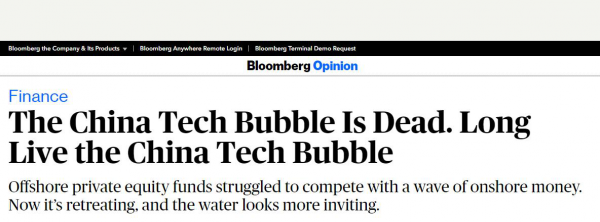When the Internet bubble burst, did China's science and technology go into battle light?
According to Bloomberg, last year, Chinese mainland funds poured into Chinese technology enterprises, pushing the valuation to bubble level. This has made life difficult for foreign private equity firms, which must make new investments to survive. But there is still a ray of light at the end of this investment tunnel. Financing from China's wealthy entrepreneurs and shadow banks is drying up, so cash for investment returns may be reduced in the future.

According to Bain Capital, more than one-third of new private equity investments in the Asia Pacific region poured into China last year. With so much money chasing limited goals, valuations will inevitably rise. The median valuation of the acquisition of Chinese technology Internet companies is 31 times that of Ebitda, twice that of other industries in Greater China, and 2.4 times that of the Asia Pacific region from 2016 to 2018.
Even private equity firms that had earlier invested in Chinese technology company financing did not perform as well as before. Johanne Dessard, director of Bain Capital, said that from 2014 to 2015, the scale of divestment of investors in Internet and technology companies in Greater China was about 4.7 times their investment. By 2016 to 2018, this proportion had fallen to less than twice.

As we can see from the stock price performance of technology companies such as smart phone manufacturer Xiaomi and takeaway app Meituan Dianping, listing does not necessarily prevent this decline.
Among the Chinese Internet and software companies listed in 2017 and 2018, 62% of the companies held by private equity lost more than 30% of their market value in the first 12 months after listing. In contrast, the average increase of listed companies in 2015 and 2016 was 105%.
The honeymoon period is doomed to end, because China's mountain of cash seeking returns has been shrinking. In 2018, RMB financing declined for the first time in eight years. In the action of the Chinese government against the P2P loan industry, the funds of P2P loan institutions dried up, and the Chinese government decided to suspend domestic IPO to support the stock market, which also closed the door for potential investors to exit.
This is an amazing reversal. At the end of 2006, after foreign capital and onshore companies were allowed to raise RMB denominated private equity funds, this field competed to surpass the Asian dollar market. According to the data of the Asian Private Equity Research Center, with the influx of wealthy entrepreneurs and interbank lending institutions in China, by 2009, RMB funds had raised $9.1 billion, while US dollar funds had raised only $3 billion.

This trend continued until last year, when the government's pressure on the asset management industry and the stock market plummeted led to the withdrawal of mainland investors. In 2018, US dollar funds raised US $34.5 billion and RMB funds raised US $10.9 billion, mainly financed by Hong Kong giants Hillhouse Capital and PAG. Hillhouse and PAG raised US $10.6 billion and US $6 billion respectively in recent rounds of financing.
Another major source of onshore funding is also drying up. Alibaba Group and Tencent Holdings are still rich in cash, but after the dramatic failures of bike sharing company Ofo and others, they become more and more picky in investment, which poses further challenges to start-ups that are already struggling with capital.
The slowdown in financing in mainland China does not mean the end of Chinese technology companies. There are still a lot of "dry goods": at the end of last year, the unused funds invested in the Asia Pacific region reached a record 317 billion dollars, which is enough to fund three years of investment at the current rate. The Shanghai Stock Exchange is seeking to establish a NASDAQ style technology sector, which may boost valuation.
This may be enough to give foreign private equity firms a break this year and select some targets. For many years, overseas investors have been competing with Chinese funds for investment objectives in mainland China, but all of them ended in failure. Now they may finally have the upper hand.


